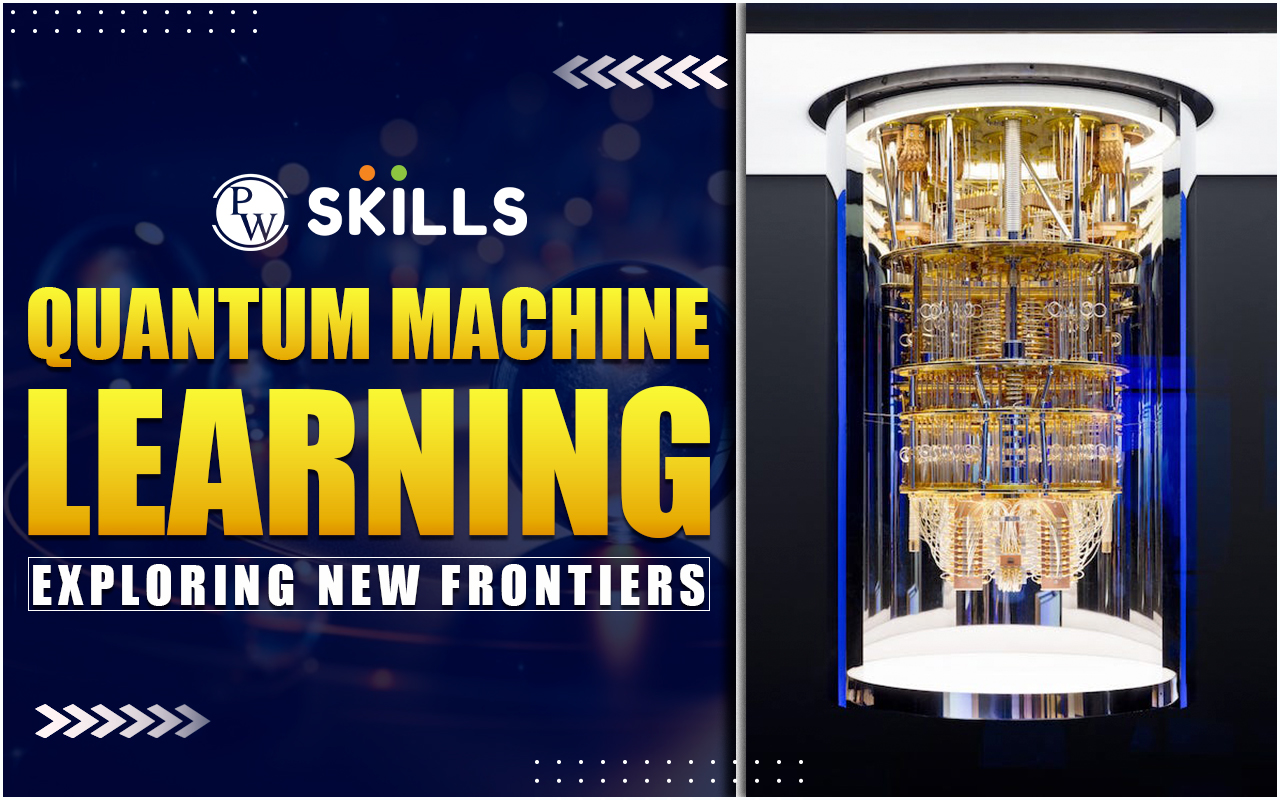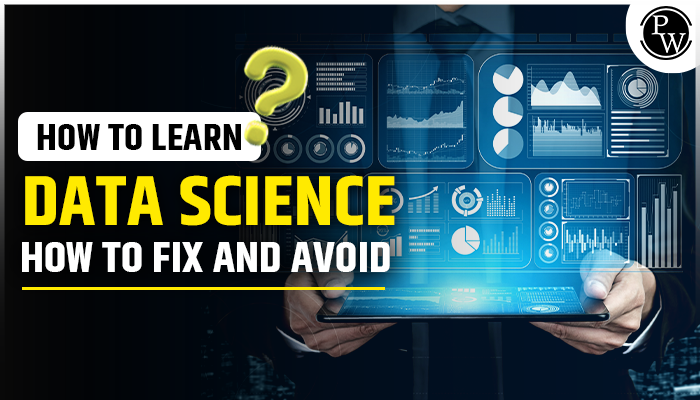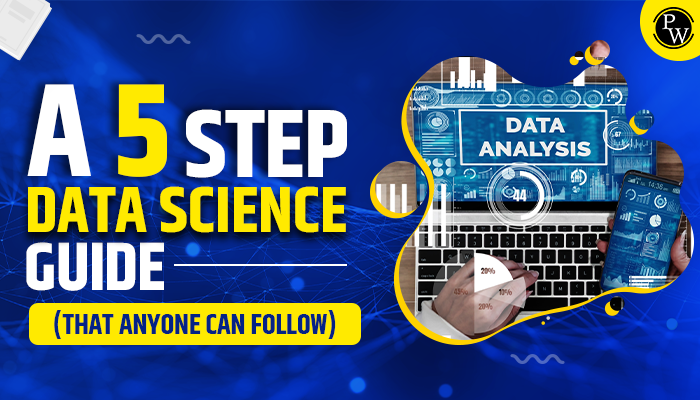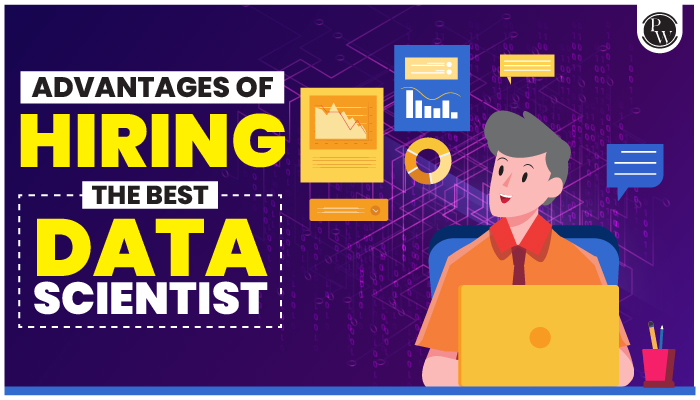Quantum Machine Learning: In the ever-evolving landscape of technology, the convergence of quantum computing and machine learning has emerged as a frontier with the potential to revolutionise computational capabilities. This link between quantum mechanics and artificial intelligence is aptly termed “Quantum Machine Learning” (QML).
It represents a paradigm shift in how we approach complex problem-solving and data analysis. In this blog, we’ll talk about quantum machine learning, its applications, tutorials for beginners, and the intersection with the Python programming language.
If you want to make a successful and high-paying career in data science, then the Decode Data Science with ML 1.0 course could be just what you need! Our course teaches you everything that is required to secure a high-paying job in data science.
What is Quantum Machine Learning?

Quantum Machine Learning blends quantum mechanics and machine learning algorithms. Quantum mechanics, the physics branch focusing on particle behaviour at the quantum level, introduces ideas like superposition and entanglement. QML leverages these phenomena to perform computations in ways that classical computers cannot.
In traditional computing, bits exist in a binary state, representing either a 0 or a 1. Quantum bits, or qubits, differ fundamentally. Particles exist in superposition, being both 0 and 1 at the same time. This dual nature empowers quantum computers to handle extensive information simultaneously, unlocking unparalleled computational capabilities.
Quantum Machine Learning Uses
The applications of Quantum Machine Learning (QML) are as diverse as they are promising, leveraging the unique quantum properties to address computational challenges that classical computers find daunting.
Optimization Problems
- Classical Limitations: Traditional optimization algorithms face considerable challenges when dealing with complex, multi-dimensional problems. The time required to explore potential solutions grows exponentially with the problem’s size.
- Quantum Advantage: QML algorithms, such as the Quantum Approximate Optimization Algorithm (QAOA), demonstrate significant speedup in solving optimization problems. This is particularly advantageous in financial portfolio optimization, where the optimization of asset allocations can be performed more efficiently with quantum algorithms.
Data Analysis and Processing
- Classical Challenges: As datasets grow larger and more complex, classical computers struggle to analyse and process information in a reasonable timeframe.
- Quantum Advantage: QML can efficiently handle large datasets due to its ability to process multiple pieces of information simultaneously. This is particularly beneficial in fields such as logistics, where route optimization and resource allocation require the analysis of massive amounts of data.
Machine Learning Model Training
- Classical Challenges: Training machine learning models, especially deep neural networks, demands significant computational resources and time.
- Quantum Advantage: Quantum computers excel in certain aspects of linear algebra, a fundamental component of machine learning. Quantum algorithms can potentially expedite the training process for certain types of models, offering a unique advantage in the realm of artificial intelligence.
Drug Discovery and Material Science
- Classical Approaches: The discovery of new drugs and materials involves extensive simulations and analyses, often requiring supercomputing resources.
- Quantum Advantage: QML enables more efficient simulation of molecular structures, allowing for rapid exploration of chemical spaces. This has profound implications for drug discovery, where identifying novel compounds quickly is critical, and for material science, where the search for optimal materials with specific properties can be significantly accelerated.
Pattern Recognition
- Classical Limitations: Classical machine learning algorithms may struggle with certain types of pattern recognition tasks, especially when dealing with high-dimensional data.
- Quantum Advantage: Quantum-enhanced machine learning algorithms, such as the Quantum Support Vector Machine (QSVM), exhibit improved performance in pattern recognition tasks. This has applications in image and speech recognition, where the ability to recognize complex patterns quickly is essential.
Cryptography and Security
- Classical Challenges: Classical cryptographic algorithms, particularly those based on factoring large numbers, face potential vulnerabilities with the advent of powerful quantum computers.
- Quantum Advantage: Quantum computers, with algorithms like Shor’s algorithm, can factor large numbers exponentially faster than classical algorithms. This poses a threat to classical cryptographic methods but also opens the door to new quantum-resistant cryptographic techniques.
Climate Modeling and Simulation
- Classical Approaches: Climate modelling and simulation require immense computational power for accurate predictions and assessments.
- Quantum Advantage: QML can contribute to faster and more accurate simulations, facilitating climate modelling and the study of complex environmental systems. This could lead to improved understanding and mitigation strategies for climate change.
Financial Modeling and Risk Assessment
- Classical Limitations: Traditional financial models often oversimplify complex market dynamics, leading to limitations in risk assessment and prediction.
- Quantum Advantage: QML can enhance financial modelling by efficiently processing large datasets and optimising complex portfolios. This can lead to more accurate risk assessments and better-informed investment strategies.
Quantum Machine Learning Tutorial
Embarking on Quantum Machine Learning (QML)? A tutorial’s your guide. Grasp the basics, merge quantum mechanics, and machine learning. Set a firm foundation for diving into this cutting-edge realm.
Quantum Mechanics Primer
Before delving into Quantum Machine Learning, it is essential to acquaint oneself with the foundational principles of quantum mechanics. Unlike classical mechanics, where information is encoded in classical bits as either 0s or 1s, quantum bits or qubits possess a unique quality known as superposition. This property enables qubits to exist in multiple states simultaneously, providing a quantum system with an inherent level of parallelism.
Additionally, the concept of entanglement plays a pivotal role. When qubits become entangled, the state of one qubit is directly tied to the state of another, regardless of the physical distance between them. This interdependence allows quantum systems to exhibit correlations that defy classical intuition.
Quantum Algorithms Overview
Quantum algorithms, key elements in Quantum Machine Learning, use quantum mechanics principles for computations beyond classical computers’ capability. Grasping quantum algorithm basics is vital to comprehend their role in machine learning.
Algorithms like Grover’s and Shor’s showcase the quantum advantage. Grover’s algorithm excels in searching unsorted databases quadratically faster than classical algorithms, while Shor’s algorithm exponentially speeds up the factoring of large numbers. These algorithms exemplify the quantum speedup and efficiency that can be harnessed for specific computations.
Practical Implementation with Quantum Circuits
To apply quantum algorithms in Quantum Machine Learning, one must comprehend the concept of quantum circuits. Quantum circuits are analogous to classical circuits but operate with qubits and quantum gates. Qubits undergo transformations through quantum gates to perform computations.
A tutorial often progresses into constructing basic quantum circuits for specific tasks, demonstrating how to implement quantum algorithms step by step. This hands-on approach allows learners to visualise the quantum operations and understand how qubits evolve during the computation process.
Quantum Parallelism and Quantum Entanglement
As the tutorial advances, the discussion delves deeper into the unique aspects of quantum computing that contribute to its power. Quantum parallelism, stemming from superposition, enables quantum computers to process multiple solutions to a problem simultaneously. This property is harnessed to explore multiple possibilities in parallel, a capability that classical computers lack.
Quantum entanglement, another key concept, further enhances computational capabilities. The entanglement of qubits facilitates the creation of quantum states that carry richer information than classical states. Understanding how quantum parallelism and entanglement synergize provides insights into why quantum computers hold the potential for exponential speedup.
Hands-On Experience with Quantum Machine Learning Frameworks
To facilitate practical application, the tutorial introduces popular quantum machine learning frameworks. Qiskit, developed by IBM, and Cirq, developed by Google, are two prominent frameworks that allow users to create, simulate, and run quantum circuits. These frameworks often come equipped with tools designed specifically for quantum machine learning tasks.
Guiding learners through the installation and utilisation of these frameworks, the tutorial ensures a hands-on experience with quantum machine learning tools. While coding examples are integral for a deeper understanding, the focus is on the mechanics of employing these frameworks for various quantum algorithms.
Quantum Machine Learning Applications
The applications of Quantum Machine Learning (QML) are vast and diverse, showcasing its transformative potential across various industries. As the marriage of quantum computing principles and machine learning algorithms progresses, new avenues for solving complex problems and optimising processes emerge. Here, we delve into the practical applications of QML, highlighting its impact on finance, logistics, healthcare, and beyond.
Optimization in Finance
One of the key applications of QML lies in optimising complex financial processes. Traditional finance models often grapple with intricate optimization problems, such as portfolio management and risk assessment. Quantum algorithms, with their ability to process multiple possibilities simultaneously, offer a unique advantage in finding optimal solutions to these challenges.
Quantum machine learning enables financial institutions to enhance their portfolio optimization strategies. By efficiently exploring a vast solution space, quantum algorithms can identify optimal investment portfolios that balance risk and return. This capability has the potential to revolutionise asset management and significantly improve financial decision-making processes.
Logistics and Supply Chain Management
Logistics and supply chain management involve intricate networks of transportation, distribution, and inventory management. Optimising these networks is a complex task, especially as the scale of operations increases. Quantum machine learning algorithms provide a means to address these optimization challenges effectively.
In logistics, QML can be employed to optimise routes for transportation, minimising costs and maximising efficiency. Quantum algorithms excel at solving combinatorial optimization problems, allowing for the simultaneous evaluation of multiple routes and configurations. As a result, businesses can streamline their supply chain operations, reduce costs, and enhance overall logistics efficiency.
Drug Discovery and Material Science
In the field of healthcare, quantum machine learning holds promise for accelerating drug discovery and advancing material science. The ability to simulate and analyse molecular structures with unprecedented speed and precision opens new possibilities for scientific research.
These algorithms effectively simulate molecule behaviour, aiding researchers in examining drug possibilities and analysing intricate chemical interactions. This could markedly cut down time and resources needed for drug discovery, fostering the creation of innovative treatments and therapies.
Similarly, in material science, QML can be applied to optimise the properties of materials for specific applications. This includes designing materials with enhanced conductivity, strength, or other desired characteristics. The exploration of quantum states in materials at a computational level allows scientists to predict and engineer materials with tailored properties, revolutionising material design and innovation.
Pattern Recognition and Machine Learning Enhancement
Quantum machine learning algorithms show great promise in enhancing pattern recognition capabilities. Traditional machine learning models often struggle with processing and analysing large datasets, leading to performance limitations in tasks such as image and speech recognition.
QML algorithms, leveraging quantum parallelism, can process vast amounts of data simultaneously. This capability is particularly advantageous in tasks that require the analysis of complex patterns or the identification of subtle correlations within extensive datasets. As a result, quantum-enhanced machine learning models have the potential to outperform classical counterparts in tasks that demand high computational power and pattern recognition accuracy.
Simulating Quantum Systems
Beyond the traditional realms of optimization and pattern recognition, quantum machine learning finds applications in simulating quantum systems themselves. Quantum computers are inherently well-suited for modelling the behaviour of quantum particles and systems, offering a powerful tool for researchers in physics, chemistry, and materials science.
QML allows scientists to simulate quantum systems with a level of accuracy and efficiency that classical computers struggle to achieve. This has implications for understanding fundamental physical processes, simulating chemical reactions, and exploring the behaviour of materials at the quantum level. The ability to accurately simulate quantum systems opens avenues for advancements in fundamental scientific research and the development of new materials with tailored properties.
Quantum Machine Learning Python
Python, a versatile and widely-used programming language, plays a pivotal role in the implementation of QML algorithms. Several quantum machine learning libraries and frameworks in Python facilitate the development and execution of quantum algorithms.
Qiskit, developed by IBM, is a Python library that enables users to create, simulate, and run quantum circuits on IBM’s quantum computers. The library also includes tools for developing quantum machine learning algorithms. Similarly, Google’s Cirq is a Python library designed for the development of quantum circuits and algorithms.
To get started with QML in Python, it’s essential to familiarise oneself with these libraries. Online resources and tutorials, often accompanied by code snippets, provide a practical guide for implementing QML algorithms using Python.
Quantum Computing Machine Learning Examples
To grasp the transformative potential of quantum computing in machine learning, exploring real-world examples is illuminating. Quantum algorithms, such as Grover’s algorithm and Shor’s algorithm, exemplify the superiority of quantum computers in certain computations.
Grover’s algorithm, for instance, demonstrates how a quantum computer can search an unsorted database quadratically faster than the best-known classical algorithms. Shor’s algorithm, on the other hand, factors large numbers exponentially faster than the best-known classical algorithms. These examples highlight the exponential speedup that quantum computers can offer in specific computations.
Conclusion
Quantum Machine Learning stands at the forefront of technological innovation, blending the principles of quantum mechanics with the algorithms of machine learning. As we navigate this uncharted territory, the promise of unprecedented computational power, efficient problem-solving, and groundbreaking applications looms large.
Are you passionate about data and problem-solving? Take your skills to the next level with the Decode Data Science with ML 1.0 course. Learn advanced data science concepts, master popular tools, and work on real-world projects. Enrol today and become a data science powerhouse!




